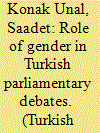|
|
|
Sort Order |
|
|
|
Items / Page
|
|
|
|
|
|
|
| Srl | Item |
| 1 |
ID:
156296


|
|
|
|
|
| Summary/Abstract |
What is the representation of East Asia in Latin American legislatures? Existing studies have focused on individual politicians of East Asian descent such as Alberto Fujimori, former president of Peru, but no systematic research has been done on the political representation of East Asia in Latin America. In order to fill this gap, this study analyzes the descriptive and substantive aspects of East Asian representation in Latin America. For the descriptive dimension, this article reviews the composition of legislators of East Asian descent in each Latin American country and finds that people of Japanese descent are “overrepresented” in the Peruvian and Argentine lower houses, while people of Korean and Chinese descent are underrepresented. Using the Brazilian Chamber of Deputies as an example, this study also reveals that deputies of East Asian descent differ from other deputies in terms of their political careers. As for the substantive dimension, this study focuses on Brazilian deputies’ responses to the Twin Ocean Railroad project, one of the largest Chinese infrastructure projects in Latin America. The statistical test performed in this study shows that the deputies tend to be members of the Brazil–Peru–China Pro-Twin Ocean Railroad Caucus if they are affiliated with the Brazil–Japan Caucus, if they are from a wealthier state, or if their performance in the last election was good. In addition, they are not likely to be members of the caucus if they are affiliated with the Partido da Social Democracia Brasileira (PSDB), an important opposition party.
|
|
|
|
|
|
|
|
|
|
|
|
|
|
|
|
| 2 |
ID:
180532


|
|
|
|
|
| Summary/Abstract |
This paper assesses the substantive representation of women through parliamentary speeches in Turkey with the goal of determining whether legislative behavior differs across gender. By using content analysis of parliamentary speeches given in the Turkish Grand National Assembly between 2002 and 2011, this paper evaluates who speaks more often and on which policy areas they focus. More specifically, it examines the relative participation of women as well as the subjects they choose to address. The analysis of Turkish case is important not only to further our understanding of Turkish politics but also to improve our understanding of women in parliaments with low gender parity. The results reveal that, although there is no significant difference between female and male legislators in terms of the total speeches they delivered, gender differences exist regarding the policy preferences of MPs, even after controlling for partisan, constituency and institutional factors. Female legislators are more likely than their male colleagues to prefer speaking about women’s equality issues, children and family issues, and education. In contrast to previous findings, female legislators are as likely as male legislators to prioritize speaking on health care issues.
|
|
|
|
|
|
|
|
|
|
|
|
|
|
|
|
| 3 |
ID:
144810


|
|
|
|
|
| Summary/Abstract |
Across the globe women are accessing national legislatures and executives in unprecedented numbers. Over the last 25 years several African countries have led the way in women’s representation in parliaments and, more recently, in cabinets. At the same time, governments and foreign donors are increasingly focusing on the role of traditional leaders in local-level politics as states democratize and decentralize across the continent. Once considered hopelessly undemocratic and patriarchal, traditional leaders are more recently viewed in many African countries as one half of a viable and effective hybrid system at the local level. In addition, whereas the role of chief has been largely the preserve of African men, African women are increasingly asserting a right to become chief. This article, using Botswana as a case study, suggests that the increased presence of women in national legislatures and executives may be having a symbolic representation effect on African women who are insisting that they too may access political power, even in positions formerly unavailable to them, such as chief. This article further suggests that, like their women counterparts in African parliaments, once they gain access to political office, women chiefs may substantively represent women’s interests, in venues such as a House of Chiefs and in their communities.
|
|
|
|
|
|
|
|
|
|
|
|
|
|
|
|
|
|
|
|
|